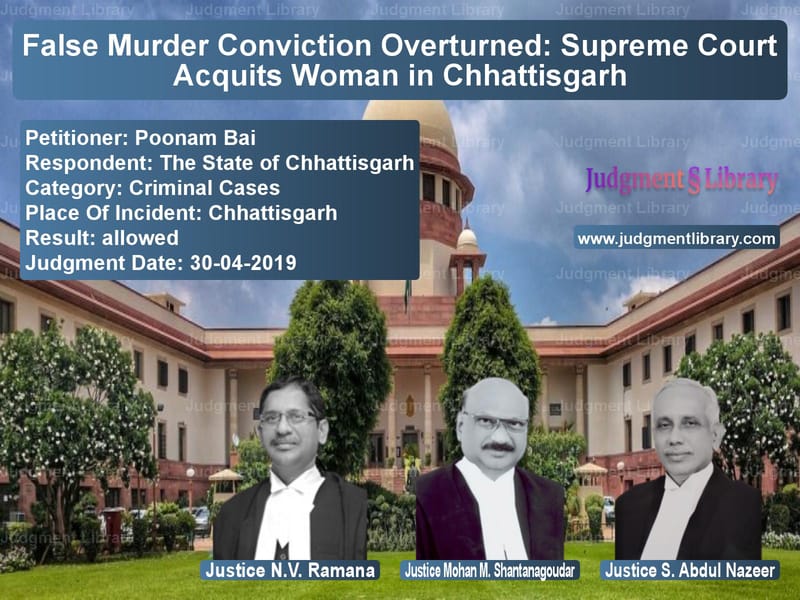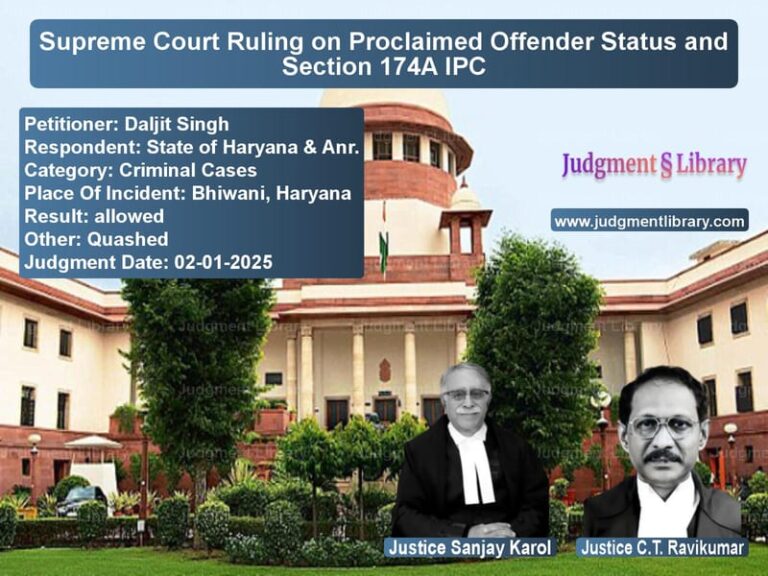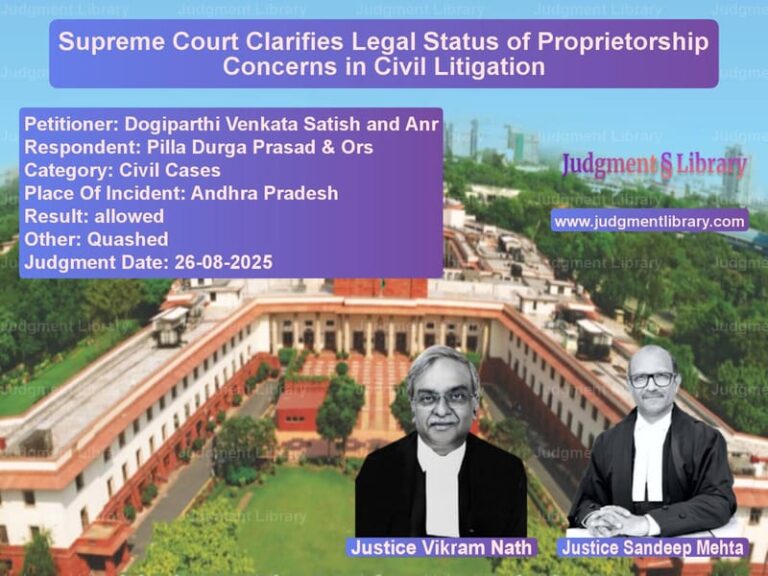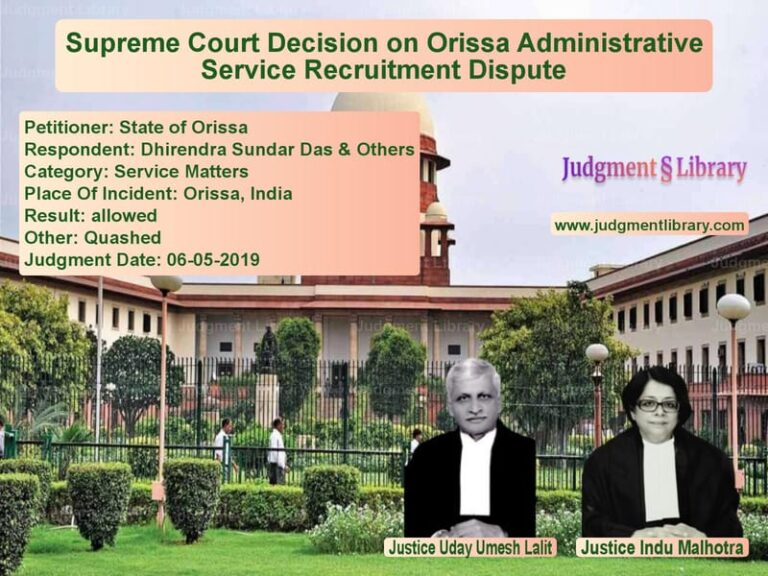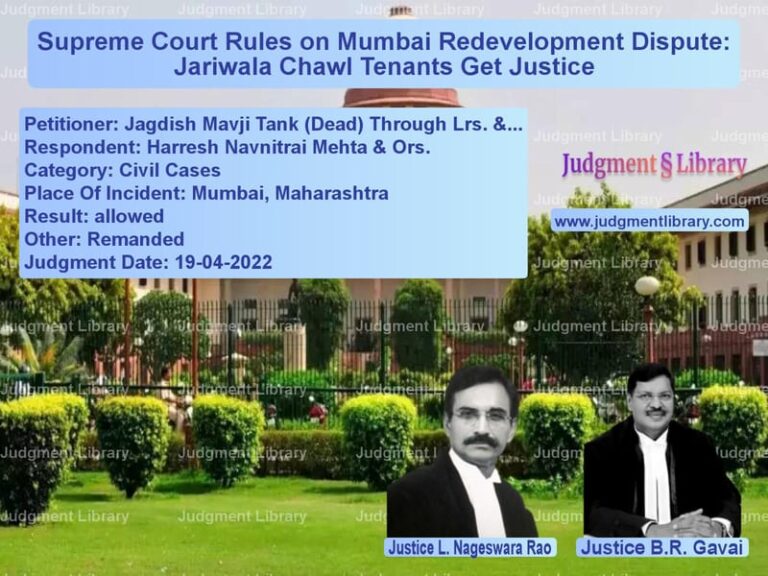False Murder Conviction Overturned: Supreme Court Acquits Woman in Chhattisgarh
The case of Poonam Bai v. The State of Chhattisgarh revolved around the alleged murder of Vimla Bai, which led to the conviction of the appellant, Poonam Bai, under Section 302 of the Indian Penal Code (IPC). The Supreme Court, in its judgment, overturned the High Court’s decision and acquitted the appellant due to unreliable dying declarations and lack of concrete evidence.
This ruling highlights the importance of ensuring due diligence in criminal trials, especially in cases where the conviction is based solely on dying declarations. The judgment brings attention to the procedural lapses and the necessity for courts to exercise extreme caution in cases lacking eyewitness testimony.
Background of the Case
The prosecution alleged that on 01.11.2001, around noon, Poonam Bai visited the house of her aunt, Vimla Bai, and after a heated argument, poured kerosene on her and set her on fire. The victim was taken to the hospital with severe burns and later succumbed to her injuries.
The incident was reported to the police at 12:05 p.m. by the deceased’s daughter, Lalita Sahu (PW-2). Based on the statements recorded during the investigation, Poonam Bai was charged with murder.
Trial Court Verdict
The Trial Court, after evaluating the evidence, acquitted Poonam Bai, ruling that the prosecution had failed to prove the charges beyond a reasonable doubt. The court noted inconsistencies in the dying declarations and pointed out procedural lapses in recording them.
High Court Judgment
The State of Chhattisgarh appealed against the Trial Court’s acquittal. The High Court reversed the verdict, convicting the appellant under Section 302 IPC and sentencing her to life imprisonment with a fine of Rs. 500.
Arguments by the Petitioner (Poonam Bai)
- The prosecution failed to establish motive for the crime.
- There were no eyewitnesses, and the case relied solely on dying declarations.
- The recorded dying declarations were unreliable due to procedural flaws.
- The High Court erred in reversing an acquittal without substantial reasons.
Arguments by the Respondent (State of Chhattisgarh)
- The victim had clearly named the appellant in her dying declarations.
- The Naib Tehsildar recorded the victim’s statement in the hospital, which should be given full evidentiary value.
- The High Court was correct in convicting the appellant based on the dying declarations.
Supreme Court’s Observations and Judgment
The Supreme Court scrutinized the reliability of the dying declarations, recognizing that while such statements can be used as the sole basis for conviction, they must be free from doubt and procedural inconsistencies.
Key observations:
- The deceased suffered 100% burn injuries and was in a state of shock, raising concerns about her ability to give a coherent statement.
- The recorded dying declaration (Exhibit P-2) was only a photocopy, and the original was never presented in court.
- The Naib Tehsildar who recorded the dying declaration admitted in cross-examination that the hospital was closed that day.
- The dying declaration lacked certification from a doctor regarding the victim’s mental and physical fitness to make a statement.
- The Investigating Officer, the first to arrive at the scene, stated that the victim was unconscious, contradicting claims that she provided a statement.
Key Judgment Excerpt:
“In order for a dying declaration to be the sole basis for conviction, it should be of such a nature that it inspires full confidence in the court. The inconsistencies in the prosecution’s case, particularly concerning the dying declaration, render the conviction unsustainable.”
Based on these findings, the Supreme Court concluded that the High Court had erred in convicting the appellant. The original acquittal by the Trial Court was reinstated, and Poonam Bai was ordered to be released immediately.
Conclusion
This case underscores the critical need for courts to ensure that dying declarations are recorded following strict legal protocols. The Supreme Court’s decision serves as a reminder that procedural lapses and unreliable evidence cannot form the basis of a conviction, particularly in cases involving severe penalties such as life imprisonment.
Petitioner Name: Poonam Bai.Respondent Name: The State of Chhattisgarh.Judgment By: Justice N.V. Ramana, Justice Mohan M. Shantanagoudar, Justice S. Abdul Nazeer.Place Of Incident: Chhattisgarh.Judgment Date: 30-04-2019.
Don’t miss out on the full details! Download the complete judgment in PDF format below and gain valuable insights instantly!
Download Judgment: Poonam Bai vs The State of Chhatti Supreme Court of India Judgment Dated 30-04-2019.pdf
Direct Downlaod Judgment: Direct downlaod this Judgment
See all petitions in Murder Cases
See all petitions in Bail and Anticipatory Bail
See all petitions in Suicide Cases
See all petitions in Judgment by N.V. Ramana
See all petitions in Judgment by Mohan M. Shantanagoudar
See all petitions in Judgment by S. Abdul Nazeer
See all petitions in allowed
See all petitions in supreme court of India judgments April 2019
See all petitions in 2019 judgments
See all posts in Criminal Cases Category
See all allowed petitions in Criminal Cases Category
See all Dismissed petitions in Criminal Cases Category
See all partially allowed petitions in Criminal Cases Category

